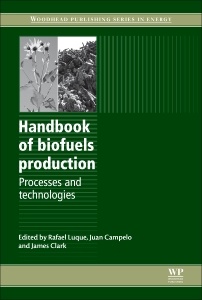Description
Handbook of Biofuels Production
Processes and Technologies
Language: English
Subject for Handbook of Biofuels Production:
Publication date: 08-2016
Support: Print on demand
Support: Print on demand
Description
/li>Contents
/li>Biography
/li>Comment
/li>
In response to the global increase in the use of biofuels as substitute transportation fuels, advanced chemical, biochemical and thermochemical biofuels production routes are fast being developed.Research and development in this field is aimed at improving the quality and environmental impact of biofuels production, as well as the overall efficiency and output of biofuels production plants. The range of biofuels has also increased to supplement bioethanol and biodiesel production, with market developments leading to the increased production and utilisation of such biofuels as biosyngas, biohydrogen and biobutanol, among others.Handbook of biofuels production provides a comprehensive and systematic reference on the range of biomass conversion processes and technology. Part one reviews the key issues in the biofuels production chain, including feedstocks, sustainability assessment and policy development.Part two reviews chemical and biochemical conversion and in turn Part three reviews thermal and thermo-chemical conversion, with both sections detailing the wide range of processes and technologies applicable to the production of first, second and third generation biofuels. Finally, Part four reviews developments in the integration of biofuels production, including biorefineries and by-product valorisation, as well as the utilisation of biofuels in diesel engines.With its distinguished international team of contributors, Handbook of biofuels production is a standard reference for biofuels production engineers, industrial chemists and biochemists, plant scientists, academics and researchers in this area.
Part 1 Key issues of biofuels production: Introduction and overview; Multiple objectives policy: Life cycle sustainability assessment; Vegetable-based feedstocks. Part 2 Chemical and biochemical conversion: Chemical catalytic conversion; Biochemical catalytic production of biodiesel; Glycerol-free and alternative biodiesels; Biodiesel from microbial oil; Bioethanol production; Biobutanol production; Other bioalcohols; Biogas via anaerobic digestion; Hydrogen. Part 3 Thermal and thermo-chemical conversion: Bio-oils via catalytic pyrolysis; Fluid catalytic cracking; Bio-syngas and biohydrogen via gasification; Bioalcohols via gasification; Hydrothermal conversion; Fischer-Tropsch synthesis; Biomass reforming. Part 4 Integrated production and application of biofuels: Biorefineries; Valorisation of by-products; Utilisation in diesel engines.
Rafael Luque (PhD 2005, Universidad de Cordoba, Spain) has significant experience in biomass and waste valorization practices to materials, fuels, and chemicals as well as nanoscale chemistry, green chemistry and (photo)catalysis (600+ publications, h-index 92, >39,000 citations, 7 patents, 10 edited books). He is Editor-in-chief of Molecular Catalysis (Elsevier) and has been named 2018, 2019, 2020, 2021 and 2022 Highly Cited Researcher (Clarivate Analytics).
Prof James Clark is a founding director of the world-leading Green Chemistry Centre of Excellence at the University of York, UK.
Prof James Clark is a founding director of the world-leading Green Chemistry Centre of Excellence at the University of York, UK.
- A comprehensive and systematic reference on the range of biomass conversion processes and technologies
- Addresses the key issues in the biofuels production chain, including feedstocks, sustainability assessment and policy development
- Reviews chemical and bio-chemical conversion techniques as well as thermal and thermo-chemical conversion, detailing the range of processes and technologies applicable to biofuels production
© 2024 LAVOISIER S.A.S.




